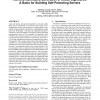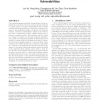7 search results - page 1 / 2 » Rethinking Memory Permissions for Protection Against Cross-L... |
150
click to vote
SIGSOFT
2003
ACM
16 years 3 months ago
2003
ACM
Writes via unchecked pointer dereferences rank high among vulnerabilities most often exploited by malicious code. The most common attacks use an unchecked string copy to cause a b...
143
click to vote
CCS
2005
ACM
15 years 7 months ago
2005
ACM
Large-scale attacks, such as those launched by worms and zombie farms, pose a serious threat to our network-centric society. Existing approaches such as software patches are simpl...
149
click to vote
CCS
2005
ACM
15 years 7 months ago
2005
ACM
Cyber attacks against networked computers have become relentless in recent years. The most common attack method is to exploit memory corruption vulnerabilities such as buffer ove...
119
click to vote
CCS
2009
ACM
15 years 5 months ago
2009
ACM
Code injections attacks are one of the most powerful and important classes of attacks on software. In such attacks, the attacker sends malicious input to a software application, w...
107
click to vote
CCS
2004
ACM
15 years 7 months ago
2004
ACM
Address-space randomization is a technique used to fortify systems against bu
er over
ow attacks. The idea is to introduce arti
cial diversity by randomizing the memory location o...


